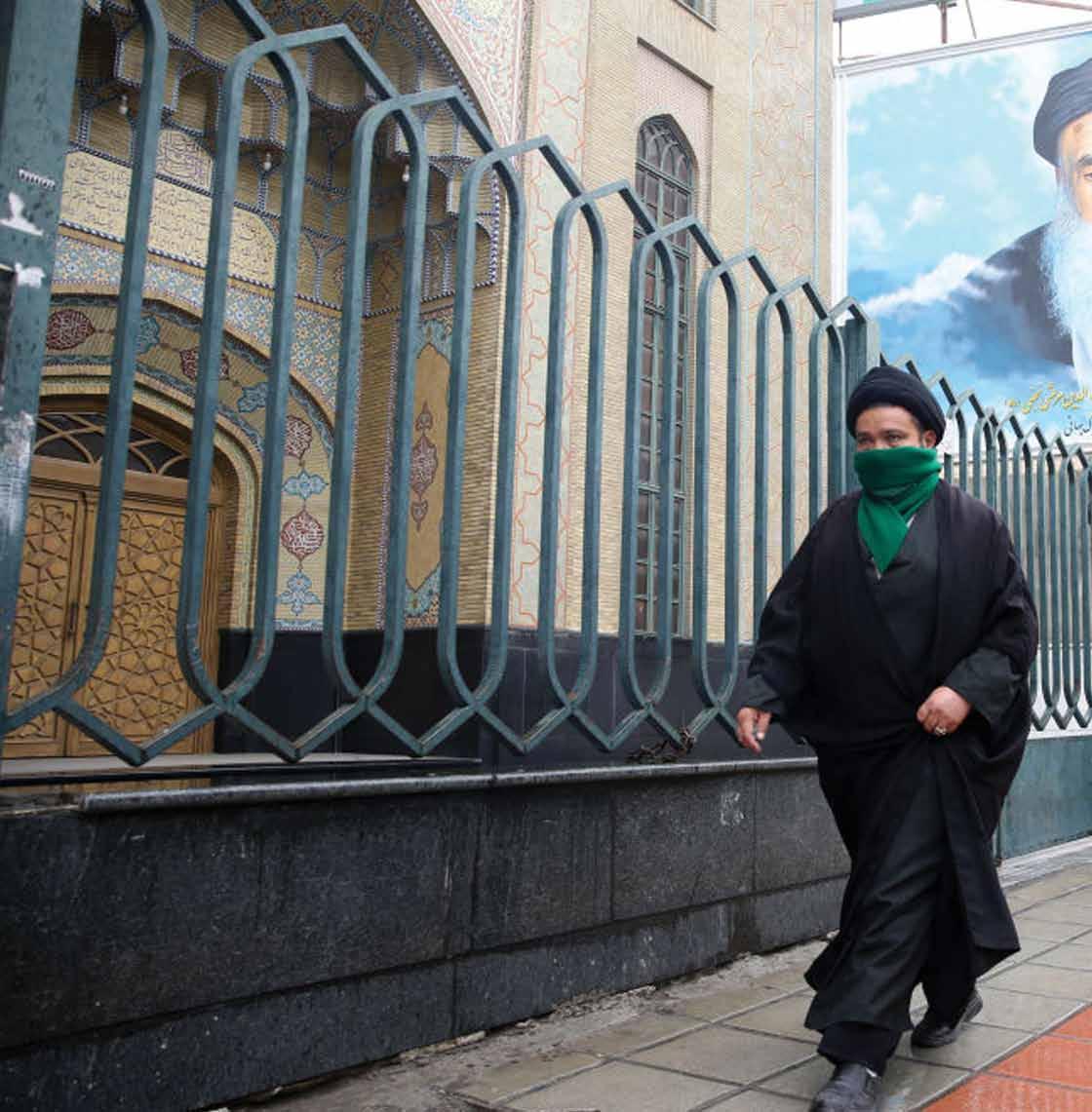
13 minute read
Iran’s Virus Diplomacy
olitics P
Iran’s Virus Diplomacy With US Sanctions Intact, Tehran’s Desperate Plea for Funds Gains Traction in Europe and the Gulf
by Yasmine El-Geressi The coronavirus has hit the Middle East at a time when the region is already burdened with a series of long-running conflicts, economic crises, and political unrest. The first Covid-19 deaths in the region were reported on February 19, when two Iranians died from the virus in the holy city of Qom. The economically hamstrung country quickly became the Middle East’s coronavirus epicenter and currently has almost 5,000 official deaths, although the unofficial numbers are expected to be much higher. According to many predictive models, the coronavirus could kill 0.5 million to 1.5 million people in the Islamic republic and authorities in Tehran have come under extensive scrutiny at home and abroad for their delayed response and lack of transparency. As the country faces an internal struggle to combat the virus, many are questioning how the emergency will impact relations between a desperate Tehran and its adversaries.
A man covers his face with a scarf after deaths and new confirmed cases revealed from the coronavirus in Qom, Iran on February ,25 2020. (Getty)
General Qasem Soleimani by the United States and the strike targeting Iraq’s Ain al-Asad military base by Iran in response.

Iran says that US sanctions have impeded its ability to import equipment vital for controlling the pandemic but the US frequently reiterates that the sanctions exempt the sale of medicine and medical devices.
Before the virus, sanctions had already cost Iran about $200 billion in revenue, mainly from decimated oil sales, and devalued the currency by half in the past two years. Economists said the coronavirus would shrink Iran’s GDP by a third and create at least a $10 billion budget deficit this year.
Thus, a broad campaign was started to call for removing sanctions. This collective effort included Iranian Foreign Minister Mohammad Javad Zarif writing a letter to UN Secretary-General Antonio Guterres; Iranian President Hassan Rouhani issuing a message to the people of America; 235 Iranian artists writing a letter to their global counterparts; and Iranian activists, scholars and intellectuals — many of whom are based abroad and part of the opposition to the Iranian state — writing to Trump. In another sign of desperation, Iran made its first request to the International Monetary Fund since the 1960s – asking for a $5 billion emergency loan.
US-IRAN RELATIONS WORSEN The outbreak of coronavirus has prompted unprecedented health and economic crises in both the US and Iran. But while the crisis could have provided Tehran and Washington an opportunity to cooperate against a common foe, the hostility and mistrust between them has proven too wide to bridge. Despite the disasters, both countries are escalating their years-long conflict which been more or less static since the killing of But the Trump Administration has been unequivocal: the spread of the virus will not save it from the US sanctions. Secretary of State Mike said in a tweet that Iran’s “concerted effort to lift U.S. sanctions isn’t about fighting the pandemic. It’s about cash for the regime leaders.” He has accused Iran’s leaders of “trying to avoid responsibility for their grossly incompetent and deadly governance.” When Zarif accused the United States of waging “medical terror,” the State Department spokeswoman Morgan Ortagus
olitics P
tweeted “Stop lying,” adding, “It’s not the sanctions. It’s the regime.”
If anything, the US has doubled down, imposing fresh sanctions in March, even as it offered Iran medical aid to help combat the pandemic, which Iran refused, claiming that the virus was “created by America,” despite there being no scientific proof offered anywhere to support such claims.
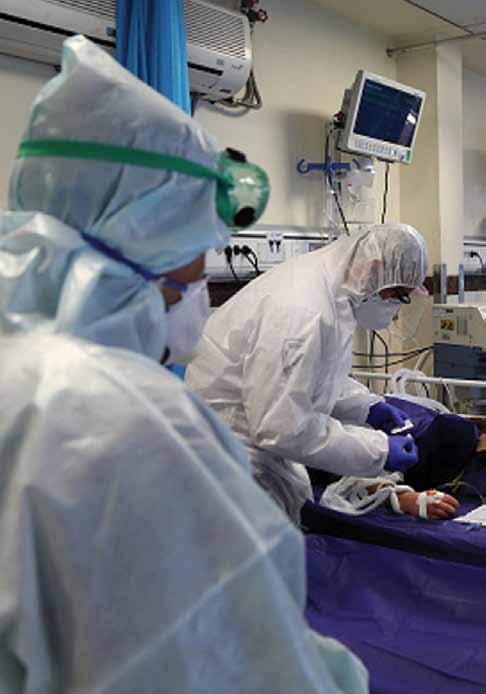
“I do not know how real this accusation is but when it exists, who in their right mind would trust you to bring them medication?” Ayatollah Ali Khamenei said, adding: “possibly your medicine is a way to spread the virus more.” He also alleged the virus “is specifically built for Iran using the genetic data of Iranians, which they have obtained through different means”.
EUROPE BYASSES US SANCTIONS
But Iran’s plea is gaining traction elsewhere, winning support from allies like Russia and China, but also the European Union and the UK.
The EU donated $22 million in humanitarian aid to Iran in March to help it fight the outbreak in its first use of the E3 financial mechanism set up last year. The “E3” (France, Germany and the UK) conceived the Instex trade channel to help European countries save a landmark international nuclear deal with Tehran after President Donald Trump withdrew the US
from the agreement in 2018. But the European states have struggled for more than 12 months to launch the mechanism in the face of technical challenges and fierce opposition from Washington.
The EU also said it will support request from Iran’s Central Bank for IMF financial help. This could create further friction with the US administration which has said it is seeking to block the request because the Iranian Central Bank is under US sanctions and is known for financing Iran’s destabilising activity.
The US also said that “any nation considering humanitarian assistance to Iran should seek the release of all dual and foreign nationals” from Iranian prisons. But the UK has taken a less stringent approach not by making the release of all its dual nationals a precondition for aid.
Health officers, wearing masks and special protective suits, take care of patients infected by the coronavirus (COVID19-) at a hospital in Tehran, Iran on March 2020 ,02. (Getty)
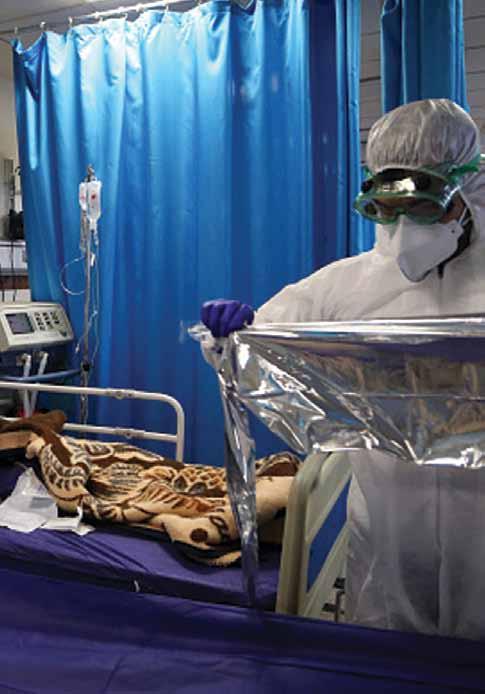
Europe over the coronavirus crisis have run in parallel with talks over the release of prisoners such as Nazanin Zaghari-Ratcliffe, raising hopes of a narrow opening for a diplomatic breakthrough. Zaghari-Ratcliffe, British-Iranian aid worker, has had her temporary leave from prison extended and is being considered for clemency. British Foreign Secretary Dominic Raab said that while this is a welcome step, the UK government now urges the Iranian government to “release all UK dual nationals arbitrarily detained in Iran, and enable them to return to their families in the UK.”
REGIONAL HUMANITARIAN OUT- REACH
Another possible diplomatic opening created by the crisis has been in expressions of support with Iran from some unexpected sources. The UAE and others in the region have shown that, whatever the existing political tensions with Iran, the current global health crisis is not a competition and cannot be fought in isolation.
The UAE has twice facilitated flights for the World Health Organisation (WHO) to deliver medical supplies and WHO experts to help 15,000 healthcare workers. Kuwait has also announced that it will donate $10 million to Iran while Qatar has sent masks and hygiene products, demonstrating that GCC countries have, temporarily at least, put aside its tense diplomatic relations with Iran to instead prioritise the urgent humanitarian crisis.
The Emirati foreign minister had a rare phone conversation with his Iranian counterpart in which he stressed ‘the importance of collective work and efforts to survive such global challenges’. Another significant step was a tweet from Iranian Foreign Ministry spokesman Seyed Abbas Mousavi, that appeared to suggest the UAE’s actions could lead towards a possible softening of bilateral relations. Mousavi applauded the UAE, as well as Uzbekistan and the United Nations’ UNICEF, for their support: ‘My country is sincerely thankful for these humanitarian efforts and will never forget the way they stood with Iran in hard times’.
Such aid and communication efforts are important and unprecedented in recent years between the longstanding regional adversaries. But while Iran declared on April 6 that its coronavirus coordination with UAE has further improved both countries’ ties, Tehran would need to dramatically change its regional policies as a prerequisite for the Emirati COVID-19 medical aid to signal the opening of a much-needed diplomatic dialogue for reducing tension in the region.
olitics P

Politicians are Embracing the Misleading Coronavirus Cure Claims Infecting the Internet Social Media Platforms and TV Broadcasters are Under Pressure to Curb the Spread of Misinformation Coming from the Top
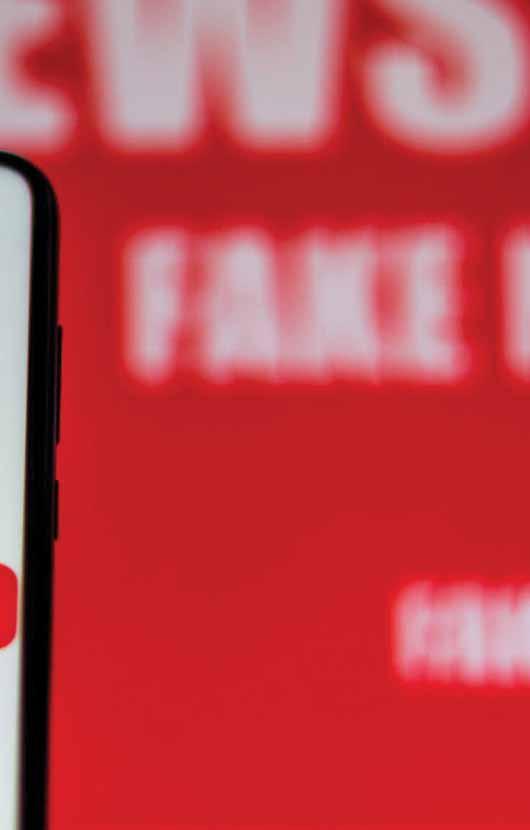
as fast as the new coronavirus. While billions of us remain stuck up our homes under strict lockdows, on WhatsApp, Facebook, YouTube and elsewhere, a range of bogus stories and conspiracy theories concerning COVID19- have gained considerable global momentum. One poll by YouGov and the Economist in March 2020 found 13 percent of Americans believed the Covid19- crisis was a hoax, for example, while a whopping 49 percent believed the epidemic might be man-made. This is, as the World Health Organization declared in February, an infodemic: “an over-abundance of information—some accurate and some not—that makes it hard for people to find trustworthy sources and reliable guidance when they need it.”
by Yasmine El-Geressi
The rise of “fake news” isn’t a creation of the digital age. Long before Facebook, from the 80s through to the 2000s dangerous rumours circulated about Aids– from the belief that the HIV virus was human-made in a government laboratory to the idea that the HIV tests were unreliable, and even the curious theory that it could be treated the milk of arthritic goats. These claims increased risky behaviour and exacerbated the crisis.
Now, in the social media age, we are seeing a fresh inundation of fake news that has spread almost At its worst, misinformation can be fatal. In Iran, over 600 people have died and over 3,000 were hospitalised after drinking high-concentration alcohol in the mistaken belief that it can cure coronavirus. “The numbers are very high and are beyond our expectations,” Iranian judicial spokesman Gholam Hossein Esmaili told a staterun news service, according to the Mirror. A video broadcast on Iranian networks and shared online showed a five-year-old boy, who had apparently gone blind after his parents gave him the liquid, hooked up to breathing apparatus. In a desperate search for a cure, families have been turning to fake remedies that have spread across social media, including alcohol, which is banned in the Islamic Republic.
Even some world leaders have been guilty of spreading inaccurate information and promoting unproven remedies that may do much more harm than good. While the jury is still out on
olitics P
its efficacy, the antimalarial chloroquine is potentially very dangerous, having recently killed a man in Arizona who drank it after hearing President Donald Trump call it “a tremendous breakthrough.” The toxic ingredient they consumed was not the medication form of chloroquine. Instead, it was an ingredient listed on a parasite treatment for fish.
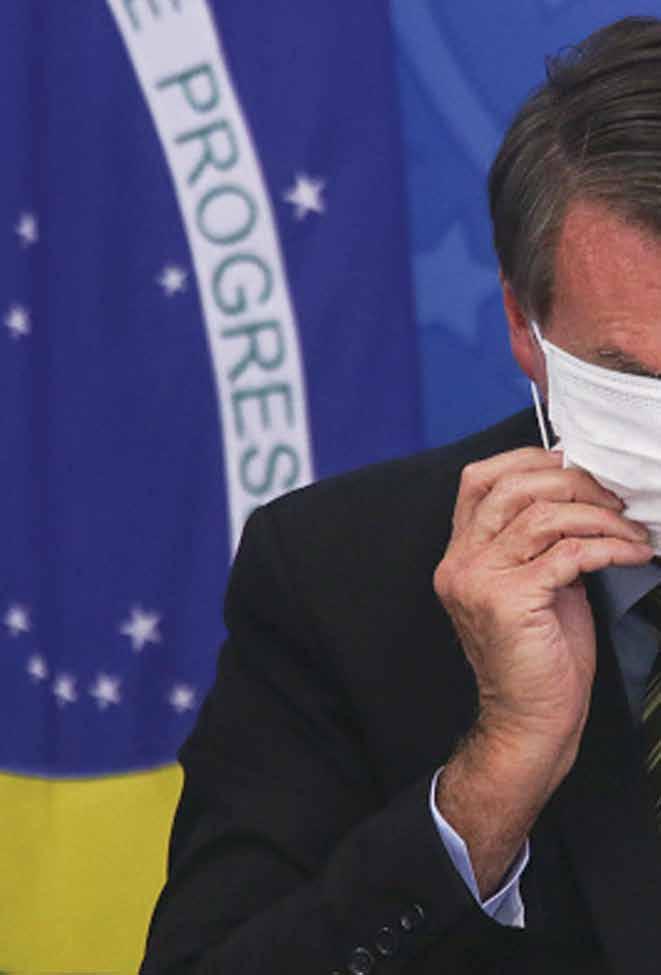
Facebook and Twitter are taking the rare step of policing world leaders and other political figures. Both social networks rarely interfere with messages from world leaders but the coronavirus has created a new sense of urgency.
Facebook and Twitter deleted a video from Brazilian President Jair Bolsonaro who asserted that the drug hydroxychloroquine was effective in treating the virus and was “working in all cases.” Facebook said it had removed the video from both that site and Instagram, which it also owns. The posts violated its community standards for causing harm, it told BBC News. He has repeatedly downplayed the virus and encouraged Brazilians to ignore medical advice on social distancing.
Twitter took down tweets from Trump attorney Rudy Giuliani, who called the treatment “100 percent effective” in treating the virus after touting a New York doctor’s dubious claims about a cure. It also deleted a tweet by Venezuelan President Nicolás Maduro who shared a virusstopping homemade “brew”.
the Study of Journalism and the Oxford Internet Institute, high-level politicians, celebrities, and prominent public figures generated %69 of the social media engagement around coronavirus misinformation, even though they accounted for only %20 of the misleading posts in a sample. The authors of the report chalk this up to the individuals’ large followings.
TV media outlets — which hold themselves to much higher editorial standards than social media networks — are now trying to find their own balance. CNN and MSNBC started cutting away from Trump’s sometimes factually incorrect speeches during the coronavirus task force briefings when they go off-topic. This week CNN even stopped its live coverage of the daily White House briefing on Monday when Trump began
President of Brazil Jair Bolsonaro adjusts his protective mask during a press conference regarding government plans and measures about the Coronavirus outbreak in Brazil. (Getty)

regulation,” reported The Verge.
In an open letter to Fox News heads Rupert Murdoch and Lachlan Murdoch, a group of 74 professors of journalism and journalists have called the network’s coverage of the coronavirus pandemic a “danger to public health”. The letter says that Fox News, which is regularly named as one of the most trusted networks in America, is endangering its own viewers, the average age of whom is 65, making them one of the two most at-risk groups to experience complications if they contract the virus.
playing a compilation of news clips portraying his handling of the pandemic in a positive light.
UN Secretary General on Tuesday saluted “journalists and others fact-checking the mountain of misleading stories and social media posts.” But some journalists have also come under fire for their coverage of the pandemic.
“Advocacy group Free Press submitted a scorchedearth complaint to the Federal Communications Commission, urging it to investigate stations airing Trump’s false statements under the “broadcast hoaxes” ban. (The FCC denied the petition, declaring that “we will not censor the news.”) The request echoed the common calls to make platforms ban misinformation — but for a medium that’s not usually seen as a target for “Viewers of Fox News, including the president of the United States, have been regularly subjected to misinformation relayed by the network—false statements downplaying the prevalence of Covid19- and its harms; misleading recommendations of activities that people should undertake to protect themselves and others, including casual recommendations of untested drugs; false assessments of the value of measures urged upon the public by their elected political leadership and public health authorities,” the letter says.
Tucker Carlson was also mentioned for his touting of a “flimsy” French study about the effectiveness of two drugs in treating the coronavirus. The next day the president referred to “very, very encouraging early results” from the drugs and called a third drug a “game changer.”




